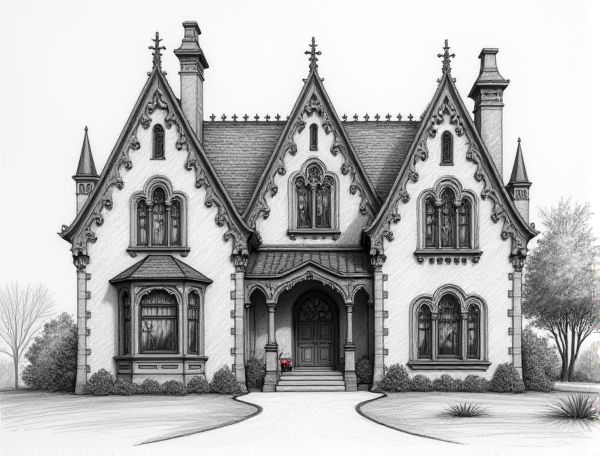
Photo illustration: Gothic Revival home design with Guastavino tile ceilings
Gothic Revival home design showcases intricate architectural details and vertical lines that evoke medieval grandeur, often enhanced by the unique Guastavino tile ceilings known for their stunning structural beauty and fireproof qualities. Explore the article to discover how incorporating these historic elements can transform your home into a timeless masterpiece.
Introduction to Gothic Revival Home Design
Gothic Revival home design features pointed arches, steep gables, and intricate tracery that evoke medieval European architecture, creating dramatic and romantic visual appeal. Your space can incorporate elements like lancet windows, decorative finials, and dark wood tones to authentically capture the historic charm and grandeur of this architectural style.
Historical Origins of Guastavino Tile Ceilings
Guastavino tile ceilings originated from the innovative techniques of Rafael Guastavino, a Spanish architect who brought his patented Catalan vaulting method to the United States in the late 19th century, revolutionizing fireproof architectural design. These tile ceilings are characterized by their thin, interlocking terracotta tiles and a herringbone pattern, providing both structural integrity and aesthetic appeal in iconic buildings like Grand Central Terminal and the Boston Public Library.
Key Elements of Gothic Revival Architecture
Gothic Revival architecture features pointed arches, intricate tracery, and steeply pitched roofs as its key elements, creating a dramatic and historic aesthetic for your home. Ornate stone or wood carvings, including gargoyles and finials, add detailed craftsmanship that enhances the design's authenticity. Tall, narrow windows with stained glass often serve both functional and decorative purposes, emphasizing verticality and light within the space.
The Art and Engineering of Guastavino Vaulting
Guastavino vaulting combines architectural artistry with engineering precision, utilizing interlocking terracotta tiles and layers of mortar to create lightweight, fireproof vaulted ceilings. This technique allows for elegant, structurally sound spans without heavy steel or wood supports, making it ideal for residential spaces seeking both beauty and durability. Incorporating Guastavino vaults enhances a home's aesthetic appeal while optimizing acoustics and natural light distribution.
Integrating Tile Ceilings into Modern Gothic Spaces
Tile ceilings add a striking architectural element to modern Gothic interiors by enhancing the room's dramatic and intricate details. Your space gains texture and depth through the contrast of ornate tile patterns against dark, moody color palettes typical of Gothic design. These ceilings also improve acoustics and lighting, creating a captivating atmosphere that complements the style's historic grandeur.
Materials and Color Palettes for Authentic Ambience
Selecting natural materials like reclaimed wood, stone, and clay enhances the authentic ambience of your home design by adding texture and warmth. Earthy color palettes featuring muted greens, warm browns, and soft neutrals create a harmonious balance that complements organic materials and promotes a cozy atmosphere. Incorporate these elements thoughtfully to achieve a timeless and inviting space that reflects genuine craftsmanship and nature-inspired beauty.
Decorative Details: Arches, Tracery, and Ornamentation
Incorporating arches, tracery, and ornamentation elevates your home's architectural character, blending historical elegance with modern design principles. These decorative details not only enhance aesthetic appeal but also create focal points that reflect your unique style and craftsmanship.
Lighting Ideas to Highlight Tile Ceilings
Incorporating recessed LED spotlights around the perimeter of tile ceilings effectively emphasizes texture and detail while creating ambient illumination. Installing adjustable track lighting allows for directional focus on intricate tile patterns, enhancing visual depth and architectural interest. Layering soft cove lighting with warm-tone bulbs further accentuates ceiling contours and adds a cozy atmosphere to the space.
Restoration and Maintenance Considerations
Restoration and maintenance considerations in home designing enhance the longevity and value of your property through the use of durable materials, proper sealing, and regular inspections for wear and tear. Implementing energy-efficient systems and moisture control not only preserves structural integrity but also reduces long-term repair costs.
Inspiring Examples of Gothic Revival Homes with Guastavino Ceilings
Gothic Revival homes featuring Guastavino ceilings combine architectural grandeur with intricate tilework, creating stunning vaulted spaces that enhance both aesthetics and acoustics. These homes showcase the distinctive ribbed vaults and ornate patterns characteristic of Guastavino construction, offering timeless elegance and structural innovation. Your home design can evoke this captivating style, adding historical depth and unique visual appeal to your living space.
 homedesy.com
homedesy.com